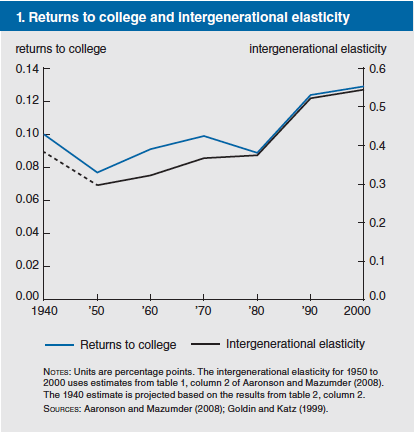 Is the American Dream harder to achieve now than a generation ago?
Is the American Dream harder to achieve now than a generation ago?
In response to my July 10th testimony to the Senate Committee on Finance hearing on “Helping Young People Achieve the American Dream” I received some homework, a series of questions asking me for a good deal more detail. You can review all of the questions on my November 11th post, but this one posed by the Committee Chairman, Senator Max Baucus of Montana, is particularly relevant.
Compared to many other countries the United States is both more unequal, and more of this inequality is passed on to the next generation.
Knowing where Americans stand compared to other countries is interesting because it helps us to begin to understand the underlying causes, and hence how public policy might influence outcomes.
But for the same reasons it is just as interesting, if not more so, to compare the United States not just to other countries, but to itself in a previous time.
Senator Baucus asks the following:
Most analysts seem to agree that the mobility between generations is lower in the United States than it is in other wealthy countries, but the trend over time is less clear. How has mobility changed over time in the United States? What can we do to make sure that mobility is higher in the future?
This is a good question to take up after having responded to Senator Hatch’s question, which deals with the importance of consistently measuring mobility over long periods that involve important economic changes. The question also deals with changes, but asks us to focus on how the degree of generational mobility has changed, and what might be the underlying cause.
The one sentence answer to Senator Baucus’s question is: generational mobility declined after 1980.
The degree of generational earnings mobility, as measured by the percentage of family income advantage that is passed on to sons, was relatively constant during the 1950s, 1960s, and 1970s at between 30 and 40%, but then rose during the 1980s and remained relatively constant thereafter at over 50%. These changes are associated with changes in the economic returns to schooling, which is an important channel through which inequality influences opportunity.
Bhashkar Mazumder, senior economist with the Federal Reserve Bank of Chicago offers the evidence for this in an article called: “Is intergenerational economic mobility lower now than in the past?“. This report summarizes Mazumder’s more detailed research in a way that places the findings in the context of other research on the same topic, and, just as importantly, also relates his findings to an economic framework that allows us to make sense of the patterns.
In particular, he notes that while the degree of mobility varies, it varies in a particular way: the greater the return to college, the greater the degree to which economic advantages and disadvantages are passed on across generations.
In an article published in 2004, Susan Mayer and Leonard Lopoo state:
…intergenerational mobility can change for at least three reasons: (1) changes in the relative investments in rich and poor children; (2) changes in the payoff to the investments; or (3) changes in the returns to genetic or biologically transmitted characteristics. When inequality increases as it has in most rich democracies over the last two decades, we might expect an increase in the inequality of investments that rich and poor parents can make in their children, and hence a decline in intergenerational mobility.
Mazumder’s juxtaposition of the patterns in the returns to college education and the degree of mobility are meant reflect the workings of the first two reasons: a higher return to college implies more inequality, which in turn implies that relatively well to do parents have both more resources to invest in their children, and more incentive to do so.
If we are searching for the underlying causes of mobility this points us directly to the education system, the extent to which it helps level the playing field, and how ultimately the skills of new graduates interact with the requirements of new jobs to determine economic well-being and inequality.
But Mayer and Lopoo also state:
However, parents are not the only source of investment in children. … if governments make significant investments in children, the correlation between parents’ and children’s income is likely to decline. Federal and state government expenditures on behalf of children have increased greatly over the past thirty years in the United States.
So if we are searching for the underlying causes of mobility we need also to address other government programs, and the extent to which this spending is of relatively more advantage to the relatively disadvantaged, and how effective it is in improving the prospects of children.
We are pointed in these directions in order to answer Senator Baucus’s second question—What can we do to make sure that mobility is higher in the future?—as well as some of the other questions posed by the Senator and the other members of the Committee on Finance.
[ If you would like to explore the details, here are the sources I am drawing upon:
Daniel Aaronson and Bhashkar Mazumder (2008). “Intergenerational Economic Mobility in the United States, 1940 to 2000.” Journal of Human Resources. Vol. 43, No. 1 (Winter), pages 139-171.
Susan E. Mayer and Leonard M. Lopoo (2004). “What do trends in the intergenerational economic mobility of sons and daughters in the United States mean?” In Miles Corak (editor). Generational Income Mobility in North America and Europe. Cambridge UK: Cambridge University Press.
Bhashkar Mazumder (2012).”Is intergenerational economic mobility lower now than in the past?” Chicago Fed Letter. The Federal Reserve Bank of Chicago. April 2012, Number 297. ]


2 thoughts on “The US Senate wonders about tax policy for the American Dream: Senator Baucus asks if things are getting worse”